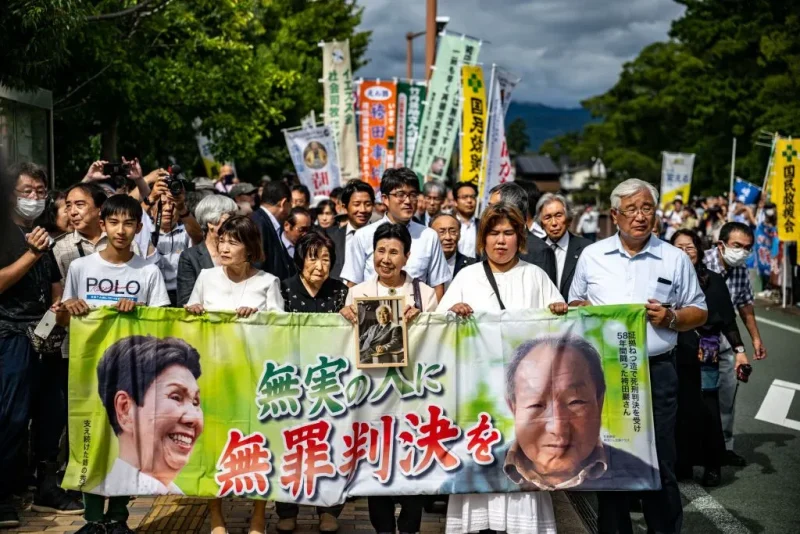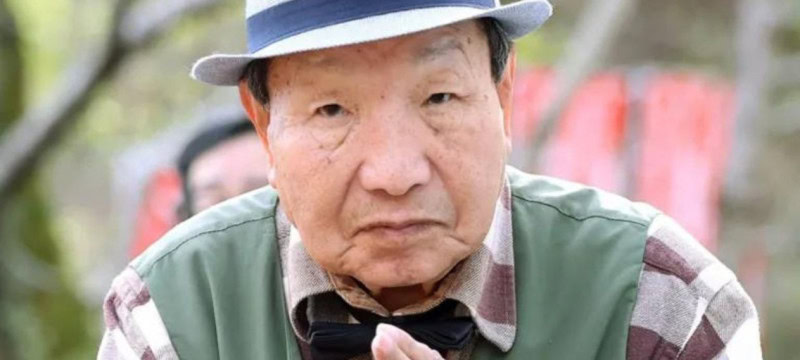An 88-year-old man, recognized as the world’s longest-serving death row inmate, has been acquitted by a Japanese court after it determined that the evidence against him had been fabricated.
Iwao Hakamada was convicted in 1968 for the murder of his boss, the boss’s wife, and their two teenage children, spending nearly 50 years on death row. Recently, he was granted a retrial due to suspicions that investigators had planted evidence that contributed to his conviction for quadruple murder.
Read more: Maggie Smith, Unforgettable Actress from ‘Downton Abbey’ and ‘Harry Potter,’ Passes Away at 89
The long years on death row severely affected Hakamada’s mental health, rendering him unfit to attend the hearing where he was finally acquitted. His case is among Japan’s most notable legal battles, drawing significant public interest, with around 500 people queuing for seats in the Shizuoka courtroom on Thursday.
As the verdict was announced, supporters outside the court celebrated by cheering “banzai,” a Japanese expression meaning “hurray.” Since his release in 2014 and subsequent retrial, Hakamada has been cared for by his 91-year-old sister, Hideko, who fought for decades to clear his name. She expressed her joy at hearing the words “not guilty” in court, saying, “When I heard that, I was so moved and happy, I couldn’t stop crying.”
Hakamada has previously described his quest for justice as a daily battle, stating, “Once you think you can’t win, there is no path to victory,” during an interview in 2018.
‘Bloodstained’ clothes in a tank of miso
Iwao Hakamada, a former professional boxer, was employed at a miso processing plant in 1966 when the bodies of his employer, the employer’s wife, and their two children were discovered in a fire at their home in Shizuoka, located west of Tokyo. All four victims had been stabbed to death.
Authorities accused Hakamada of murdering the family, setting fire to their house, and stealing 200,000 yen in cash. Initially, he denied the charges of robbery and murder, but later he provided what he referred to as a coerced confession, which came after enduring beatings and interrogations lasting up to 12 hours a day.
In 1968, Hakamada was found guilty of murder and arson and was sentenced to death.

The lengthy legal battle ultimately centered around some clothes discovered in a tank of miso a year after Hakamada’s arrest. These clothes, which were claimed to be bloodstained, were used as evidence against him.
For many years, Hakamada’s lawyers argued that the DNA found on the clothes did not match his, suggesting that the items might belong to someone else. They also raised the possibility that the police had fabricated the evidence.
This argument convinced Judge Hiroaki Murayama, who noted in 2014 that “the clothes were not those of the defendant.” He stated, “It is unjust to detain the defendant further, as the possibility of his innocence has become clear to a respectable degree.” Following this, Hakamada was released from prison and granted a retrial.
However, due to prolonged legal proceedings, the retrial did not begin until last year, and the verdict was only delivered on Thursday morning. The retrial’s key focus was on the nature of the red stains on the clothing that prosecutors claimed belonged to Hakamada. The defense questioned the aging of the stains, arguing that they remained red and had not darkened after being submerged in soybean paste for an extended period, indicating that the evidence was fabricated.
On Thursday, the ruling concluded that “investigators tampered with clothes by getting blood on them,” which they then concealed in the miso tank. Consequently, Hakamada was declared innocent.
According to his lawyers and family, decades of detention, primarily in solitary confinement and under the constant threat of execution, have severely impacted Hakamada’s mental health.
His sister has been a long-time advocate for his release. When the retrial began last year, Hideko expressed her relief, stating, “finally a weight has been lifted from my shoulders.”
Retrials for death row inmates are uncommon in Japan; Hakamada’s is only the fifth such case in the country’s post-war history. Alongside the United States, Japan is the only G7 nation that still practices capital punishment, with death row inmates being informed of their execution just a few hours beforehand.









